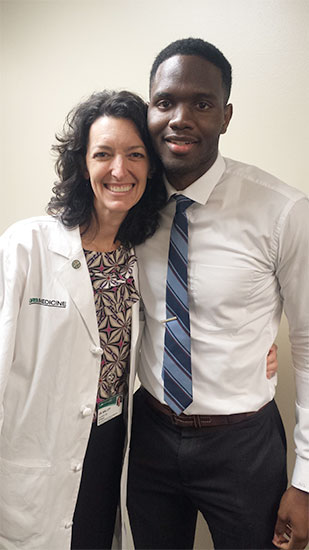In basketball, each dribble keeps the game going. In life, it is a different beat that has to stay in rhythm.
In November 2016, Anezi Uzendu, M.D., a third-year internal medicine resident at the University of Alabama at Birmingham, was playing basketball at a gym in Vestavia Hills, Alabama, when he collapsed and went into cardiac arrest. A local chiropractor who happened to be in the gym immediately came to Uzendu’s aid and started performing CPR until paramedics arrived on the scene. He was shocked more than 10 times with a defibrillator.
“The people who were at the gym were people I didn’t know, but they did a great job of stabilizing me until I could go to the hospital,” he said. “I know I was intubated and they placed me under hypothermia protocol once I was admitted.”
Taken to a nearby hospital, Uzendu was placed in a medically induced coma as part of the hypothermia protocol. With no medical or family history of heart disease, he was diagnosed with ventricular fibrillation, the most serious cardiac rhythm disturbance, where his lower chambers quiver and heart couldn’t pump any blood, causing him to go into cardiac arrest.
“My memory was kind of shaky at the time,” he said. “I couldn’t remember my address or things that happened in the weeks leading up to the event. I was really confused.”
Uzendu says he never felt overwhelmed with his memory loss because he felt a calming presence from the family members and friends surrounding him. UAB Internal Medicine Residency Program Director Lisa Willett, M.D., was instrumental in reassuring Uzendu’s family that he would be get the best possible care. After a few hours, when he was deemed stable enough to transport, he was transferred to UAB Hospital and placed in the Cardiac Care Unit.
“Dr. Willett and all the chief residents came to see me at the hospital and helped me get transferred to UAB,” he said. “They could tell that I really didn’t look well, and they wanted me to receive the best possible care, which was at UAB. Dr. Willett was really instrumental in taking care of everything while my parents were coming from St. Louis.”
 Willett and Uzendu share a special bond, and says that Uzendu’s health scare deeply affected her and the other residents.Uzendu, who will begin a cardiology fellowship at The Ohio State University this summer, spent a lot of time seeing patients in the CCU; but he never thought he would become a patient himself.
Willett and Uzendu share a special bond, and says that Uzendu’s health scare deeply affected her and the other residents.Uzendu, who will begin a cardiology fellowship at The Ohio State University this summer, spent a lot of time seeing patients in the CCU; but he never thought he would become a patient himself.
Six weeks after clinging for dear life, Uzendu was cleared and was back to seeing patients on his normal rotation schedule.
“I think one of the coolest things out of this experience is the love and overwhelming support that was shown to me while I was in the hospital from my family to the staff and fellow residents,” Uzendu said. “There were so many people offering help, whether it was covering shifts or bringing my parents food.”
Forever family
UAB School of Medicine residents stand at the forefront of resident education and are prepared for practice the moment they finish their program. Residents go through the highs and lows of practicing medicine together, and that camaraderie often translates into the creation of everlasting bonds and friendships. Residents see myriad health issues with the patients they interact with, but what happens when the resident becomes the patient?
Willett says the residency program has a unique, tightly knit bond and that Uzendu’s health scare deeply affected the other residents. Someone was always with him while he was in the CCU. Willett and Uzendu share a special relationship. As residency program director, she serves as mentor and sometimes surrogate mother to many of the UAB residents. Willet said to see one of her “children” in such a seemingly hopeless state was unforgettable.
“You can imagine the excitement and the celebration in the CCU the first time he squeezed our hand and we knew he was responding,” Willett said.
Uzendu feels the bond more than ever.
“I think, when I came to UAB, I knew there was a collegiality; but I never knew there would be a family environment like I’ve experienced in my time here,” Uzendu said. “I know that there was a lot of good that came from my illness. I think one of the things for me is to know how to empathize better with my patients. When you haven’t gone through it, it’s a little harder to know what patients go through. It was an important time of growth for me physically, spiritually and career-wise.
I know that, when I leave this place, I’ll have a whole new family.”